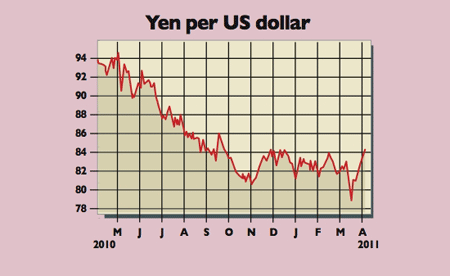The yen has further to fall
The Japanese currency has fallen fast since it hit a postwar record peak of ¥76 to the dollar, just after the earthquake and tsunami. Early this week it reached a six-month low above 84 to the dollar and an 11-month trough against the euro. Further falls are likely.
Get the latest financial news, insights and expert analysis from our award-winning MoneyWeek team, to help you understand what really matters when it comes to your finances.
You are now subscribed
Your newsletter sign-up was successful
Want to add more newsletters?

Twice daily
MoneyWeek
Get the latest financial news, insights and expert analysis from our award-winning MoneyWeek team, to help you understand what really matters when it comes to your finances.

Four times a week
Look After My Bills
Sign up to our free money-saving newsletter, filled with the latest news and expert advice to help you find the best tips and deals for managing your bills. Start saving today!
The Japanese currency has fallen fast since it hit a postwar record peak of 76 to the dollar, just after the earthquake and tsunami. Early this week it reached a six-month low above 84 to the dollar and an 11-month trough against the euro. Further falls are likely.
The post-earthquake spike was caused by investors seeking a safe haven and betting Japanese households and firms would repatriate money to help pay for the disaster. The world's major central banks then intervened by selling billions of dollars of yen. That, along with the threat of further action, appears to have "drawn a line in the sand", says Paul Niven of Foreign & Colonial. It helps that "in this instance the G7 is pushing with fundamental forces, rather than against them".
The idea that repatriation flows would drive up the yen was wrong. As Lex points out in the FT, Japanese investors were actually net buyers of foreign bonds in the week after the disaster. Only 3% of households' assets are foreign, while life insurers had plenty of cash on hand to deal with extra claims.
MoneyWeek
Subscribe to MoneyWeek today and get your first six magazine issues absolutely FREE

Sign up to Money Morning
Don't miss the latest investment and personal finances news, market analysis, plus money-saving tips with our free twice-daily newsletter
Don't miss the latest investment and personal finances news, market analysis, plus money-saving tips with our free twice-daily newsletter
It's also becoming clear, says Capital Economics, that the government will have to foot most of the bill to repair the damage. It will be reluctant to increase borrowing, given its huge debt load. That suggests that it will opt for tax hikes or spending cuts, which would hamper the recovery. What's more, while it will keep monetary policy loose and may even print more money to prop up the economy, central banks elsewhere "are starting to move in the opposite direction". That also implies further yen weakness.

With other countries set to raise interest rates, or stop printing money before Japan does, domestic investors will have an incentive to seek higher yields abroad, implying a weaker yen, says Morgan Stanley. Moreover, international investors will be tempted by the carry trade using the yen as a funding currency. In a carry trade, investors borrow a low-yielding currency, sell it and invest the money in higher-yielding currencies or assets.
The high-yielding Australian dollar has jumped by 14% against the yen in a fortnight, suggesting the yen carry trade is "building momentum" and weakening the yen, according to Camilla Stutton of Scotia Bank. Given all this, investors "should forget about yen strength", says UBS's Mansoor Mohi-Uddin.
Get the latest financial news, insights and expert analysis from our award-winning MoneyWeek team, to help you understand what really matters when it comes to your finances.
MoneyWeek is written by a team of experienced and award-winning journalists, plus expert columnists. As well as daily digital news and features, MoneyWeek also publishes a weekly magazine, covering investing and personal finance. From share tips, pensions, gold to practical investment tips - we provide a round-up to help you make money and keep it.
-
 Should you buy an active ETF?
Should you buy an active ETF?ETFs are often mischaracterised as passive products, but they can be a convenient way to add active management to your portfolio
-
 Power up your pension before 5 April – easy ways to save before the tax year end
Power up your pension before 5 April – easy ways to save before the tax year endWith the end of the tax year looming, pension savers currently have a window to review and maximise what’s going into their retirement funds – we look at how

